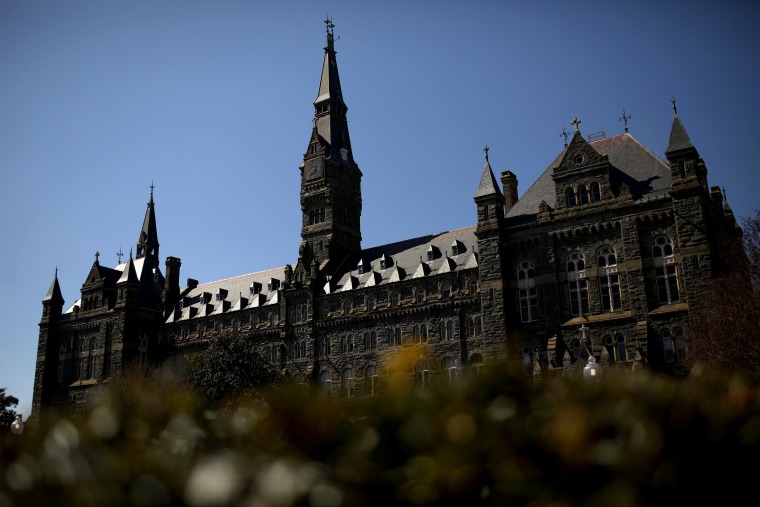The first lawsuits targeting elite universities and individuals charged by federal prosecutors in a sweeping college admissions scandal were filed by a student and parent Wednesday in California.
In her suit, Stanford University undergrad Kalea Woods claimed to be damaged because of the time and money she wasted on applications to other schools implicated in the scandal.
Separately, Jennifer Kay Toy, the parent who filed a civil complaint in San Francisco Superior Court, claimed that her son, Joshua, who had a 4.2 grade-point average, was not admitted to some schools because of the "despicable actions" of other parents implicated in the scandal.
In addition, students from Tulane University, Rutgers University and a community college in Orange County, California, filed what they're hoping will become a class-action lawsuit against William Rick Singer, who allegedly organized the complex schemes for wealthy parents, and the implicated universities.
Those schools are Stanford, the University of Southern California, the University of California, Los Angeles, the University of San Diego, the University of Texas, Wake Forest University, Yale University and Georgetown University.
The scheme, said to be led by Singer who is now a cooperating witness, allegedly included fake test scores and bribes to university sports coaches and campus officials.
The scandal came to light in federal indictments unsealed Tuesday in Massachusetts implicating many, including actresses Lori Loughlin and Felicity Huffman.
Toy's lawsuit targets Loughlin, Huffman, Singer and others indicted. It does not name the universities as defendants.
"I'm now outraged and hurt because I feel that my son, my only child, was denied access to a college, not because he failed to work and study hard enough, but because wealthy individuals felt it was OK to lie, cheat, steal and bribe their children's way into a good college," according to Toy's state civil suit, that seeks class-action status.

Woods, of Stanford, a top-tier school in Palo Alto, California, had also applied to USC, according to her lawsuit, though it wasn't immediately clear if she had been accepted by the school.
"At the time she applied, Woods similarly was never informed that the process of admission at USC was an unfair, rigged process, in which parents could buy their way into the university through bribery and dishonest schemes," the suit said.
And even though Woods is now attending Stanford, No. 7 in the latest U.S. News & World Report rankings, the federal lawsuit claims that her degree now won't carry as much weight.
"Woods has also been damaged because she is a student at Stanford University, another one of the universities plagued by the fraud scandal," according to the lawsuit, which was filed in the Northern District of California. "Her degree is now not worth as much as it was before, because prospective employers may now question whether she was admitted to the university on her own merits, versus having rich parents who were willing to bribe school officials."
Tulane student Lauren Fidelak claims she had a 4.0 high school GPA and scored 34 on her ACT, but still couldn't get into USC and UCLA.
"She was so upset that she did not get into her chosen schools that she had an emotional breakdown and needed to be hospitalized in Boston," according to the lawsuit.
Rutgers student Nicholas James Johnson was rejected by Stanford and Texas despite a 4.65 GPA earned with the help of Advanced Placement classes and a 1500 SAT score, according to the lawsuit.
Tyler Bendis, who attends a community college in Orange County, said he had a 4.0 GPA but couldn't get into UCLA, Stanford or San Diego, his lawyers said.
All the plaintiffs claimed they didn't get a fair shot at their first-choice campuses because of Singer and the "unfair admissions process" of the universities named as defendants.
"The University of Texas has a thorough, holistic admissions process," UT spokesman J.B. Bird said in a statement. "The actions alleged by federal prosecutors against one UT employee were not in line with that policy and may have been criminal. They do not reflect our admissions process."
USD spokeswoman Pamela Gray Payton said: "While we do not comment on pending litigation, our commitment to ethical conduct and integrity in our admissions policies and processes is unwavering. The university is conducting an investigation into the allegations."
Stanford spokesman E.J. Miranda added: "We believe the lawsuit filed by the students against Stanford is without merit. We take the issues raised through the events of this week very seriously. While we continue to closely examine our policies and processes to see if improvements should be made, we stand behind the integrity of our admissions process."
Representatives for USC and UCLA could not be immediately reached for comment Thursday.
CORRECTION (March 14, 2019, 11:39 a.m. ET): An earlier version of this article misspelled the first name of an actress charged in the college admissions scandal. She is Lori Loughlin, not Lauri.
